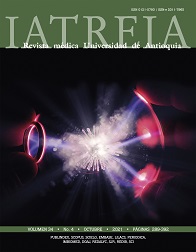Closing the gaps between teachers and students in formative assesment
DOI:
https://doi.org/10.17533/10.17533/udea.iatreia.127Keywords:
education, medical, evidence-based medicine, feedbackDownloads
References
(1) van der Vleuten CP, Driessen EW. What would happen to education if we take education evidence seriously?
Perspect Med Educ. 2014 Jun;3(3):222-32. DOI 10.1007/s40037-014-0129-9.
(2) van de Ridder JM, Stokking KM, McGaghie WC, ten Cate OT. What is feedback in clinical education? Med Educ. 2008 Feb;42(2):189-97. DOI 10.1111/j.1365-2923.2007.02973.x.
(3) Kluger AN, Van Dijk D. Feedback, the various tasks of the doctor, and the feedforward alternative. Med Educ. 2010 Dec;44(12):1166-74. DOI 10.1111/j.1365-2923.2010.03849.x.
(4) Hattie J, Timperley H. The power of feedback. Sage Journals. 2007;77(1):81–112. DOI 10.3102/003465430298487.
(5) White M, SchunemmanL, Choroco VA, Carranza-Esteban RF, Landa-Barzola M, Huancahuire-Vega S.Traducción, adaptación cultural, validez de contenido y constructo del cuestionario Feedback in medical education (FEEDME-Proveedor) en estudiantes de medicina humana. Iatreia. 2021. En prensa. DOI 10.17533/udea.iatreia.117.
(6) Bing-You R, Ramesh S, Hayes V, Varaklis K, Ward D, Blanco M. Trainees’ Perceptions of Feedback: Validity Evidence for Two FEEDME (Feedback in Medical Education) Instruments. Teach Learn Med. 2018 Apr-Jun;30(2):162-172. DOI 10.1080/10401334.2017.1392863.
Published
How to Cite
Issue
Section
License
Copyright (c) 2021 Universidad de Antioquia

This work is licensed under a Creative Commons Attribution-NonCommercial-ShareAlike 4.0 International License.
Papers published in the journal are available for use under the Creative Commons license, specifically Attribution-NonCommercial-ShareAlike 4.0 International.
The papers must be unpublished and sent exclusively to the Journal Iatreia; the author uploading the contribution is required to submit two fully completed formats: article submission and authorship responsibility.














